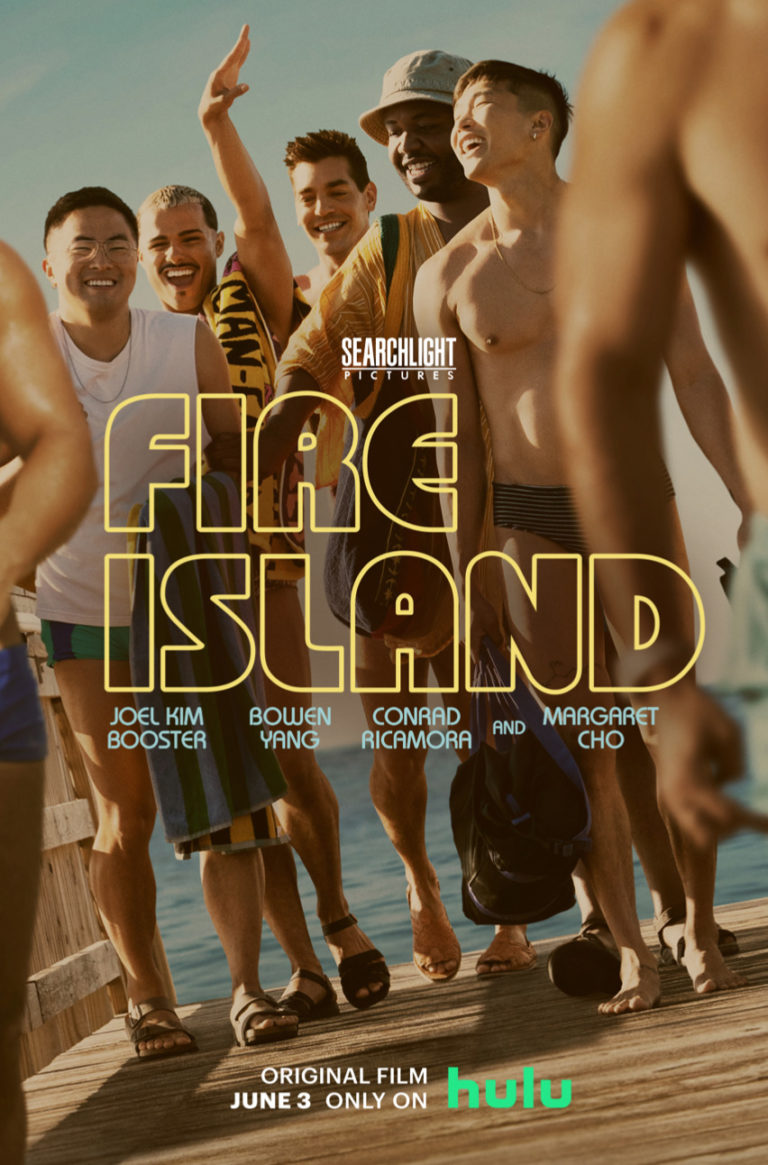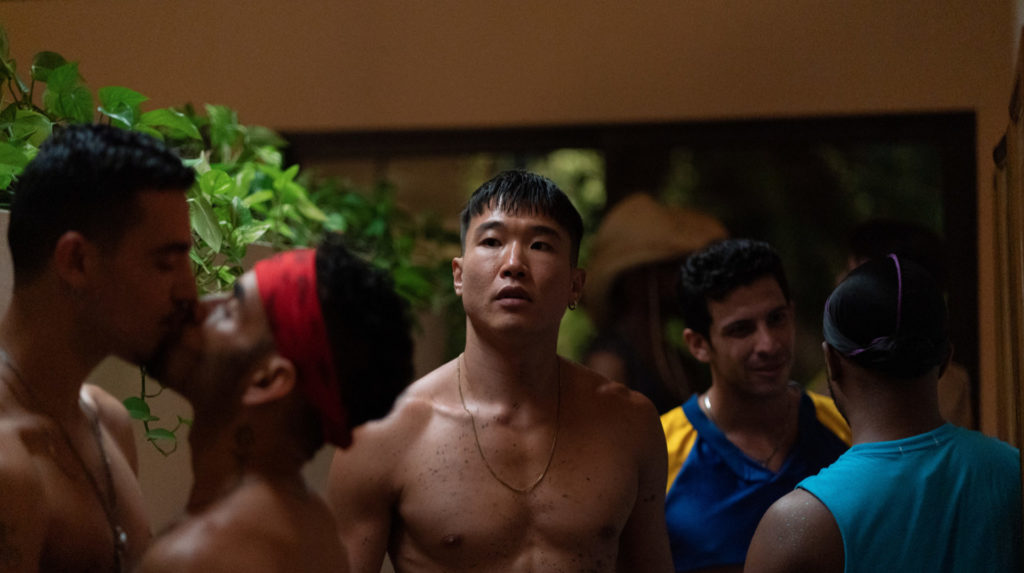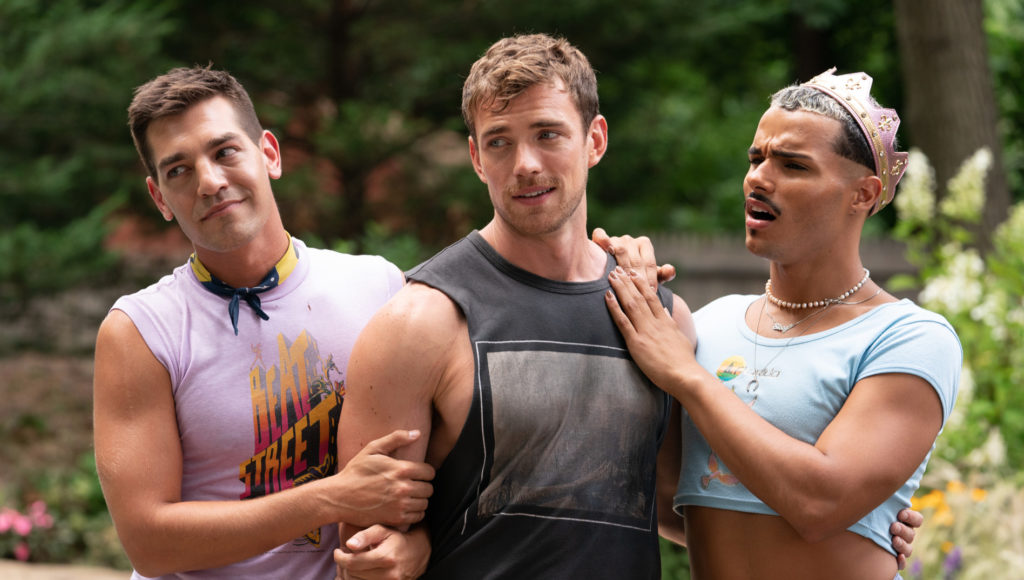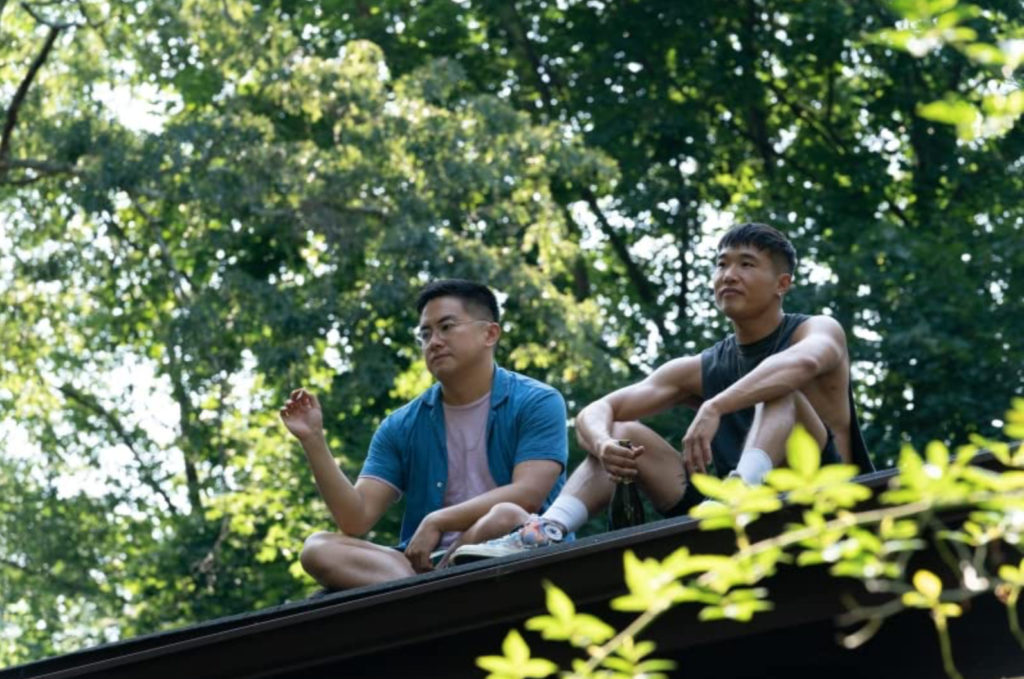
Synopsis : Set in the iconic Pines, Andrew Ahn’s “Fire Island” is an unapologetic, modern-day rom-com showcasing a diverse, multicultural examination of queerness and romance. Inspired by the timeless pursuits from Jane Austen’s classic “Pride and Prejudice,” the story centers on two best friends (Joel Kim Booster and Bowen Yang) who set out to have a legendary summer adventure with the help of cheap rosé and their cadre of eclectic friends.

Exclusive Interview with Writer/Actor Joel Kim Booster
Q: This film takes us through the mindset and experience of queer life. When you see studio films, the Asian or gay community is generally sidelined, so it’s rare to see it fully explored like it is here. How important is it for you to explore those elements?
JKB: It was extremely important to explore. I think my chosen family and those relationships in my own life are so important to me. There’s a line in the film, “You find the family that fills in the gaps.
” For me, that’s always been true in my personal life.
I come from a very conservative upbringing, a very conservative family, who I love dearly with all my heart and know loves me very much. But they can’t be everything to me. So very early in my life, I gathered people around me who can pick up the slack where I know my family can’t. As much as I wanted to write a fun, light rom-com, I also wanted to honor my relationships and my chosen family with this movie.
Q: You were born in Korea and adopted into an Evangelical Christian American family in Illinois which was very conservative and religious. You were also homeschooled until you were 16 years old. These circumstances made it difficult for you to express your feelings as a gay person. You then transitioned into an entertainment career. How did these experiences lead you to make this film?
JKB: People always expect that I’m an extrovert. I think that because of the way I was bought up, and because of all the things I had to repress and wasn’t allowed to talk about, my inner life has been working much faster than what’s going on out here. I had to keep so many secrets growing up in a religious home as a gay guy, that as soon as I was able to tell the truth, it just all spilled out like a river.
That’s why I entered the industry when I did. Stand-up comedy, specifically, was a way for me to process all the things that had been living inside for so long. Another great thing about the process of writing this movie was, because I had to keep so much hidden, honesty and truth has always been paramount to me in my work. In writing this movie, I didn’t shy away from the truth of what it is to be in this community, both the good and the bad.
Q: In this film, the characters Keegan and Luke — played by Matt Rogers and Tomas Matos — are hilarious. Howie is played by Bowen Yang, who became the first Chinese American main cast member in SNL. You’re surrounded by extremely funny people. How did you balance your own script with some of the improv moments?
JKB: As a writer, as a screenwriter, I’ve never been super-precious about lines. I’m much more interested in structure, the narratives and the story. So as long as people are in keeping with the narrative and where the plot needs to go, I’m very open to improv.
In fact, [director] Andrew [Ahn] and I talked so much about the casting process, that half the battle of doing a comedy is in the casting. We cast people specifically that I knew not only are great actors and would be able to perform my material well, but would be able to bring themselves to the characters as well. That was really exciting for us.
You know, so many of my favorite lines in the movie are lines I didn’t even write — they’re lines that came from the improv moments on set. As a writer, and as a screenwriter especially, I always view the script as a platform or blueprint for people to connect to a character, and if they want to go further and add to it, I’m almost always going to encourage that.

Q: Bowen Yang and Matt Rogers started a podcast, “Las Culturistas.” You started as a stand-up comedian.
How did you meet, and how did that lead to making this film?
JKB: I met Bowen at a show he hosted in New York in 2014. When I was starting out, there was this idea that there can only be one gay comic, and certainly there could only be one gay Asian comic that’s successful. But starting around when I started, we started to reject that idea, as a people.
When we met, we obviously check a lot of the same demographic boxes. But we’re so different, and that rather than become competitive and oppositional, we saw each other when we met up and said, “Oh my God, finally someone who understands what I go through in this industry, and the struggles that I face coming up in this industry as a comedian. Why would I ever want to do anything but befriend this person, and hold on to him as a lifeline?
Matt and Bowen have been best friends since college, so I met Matt soon after that. It really was the start of this wonderful, beautiful network of queer comedians that stopped competing and started supporting each other by saying, “We would rather work together than get through the door and close it behind us.”
Q: What’s in the script that didn’t necessarily transfer to what’s on the screen. How did you map that out carefully and work with director Andrew Ahn?
JB: A big part of that was just trusting Andrew. Half the battle was won when I hired Andrew to direct this movie. He’s so intelligent in the way he approaches his work.
If I had hired someone who was big and bombastic, and had done a ton of broad, raunchy comedies, it would have felt unbalanced. Andrew brought a really light, delicate touch to the movie that worked really well. In coupling it with Felipe Vara de Rey, who was our DP [director of photography], the movie ended up looking so gorgeous, too.
But the balance was always a tightrope walk between the comedy and the drama. I think — and I hope — that we were able to successfully pull it off.
Q: How did you get the idea of a mashup between Jane Austen’s “Pride and Prejudice” and the gay community in Fire Island?
JKB: It was very simple. The first time I went to Fire Island with Bowen in 2016, I brought “Pride and Prejudice” with me to read while there. It was while reading the book, that I realized how similar and how relevant what Jane Austen was talking about, especially with regard to class and the way people communicate across class lines. It was so relevant to me and what we were experiencing on that island at that time.
It wasn’t an immediate — like [snaps] I have it! — but after several years of going to Fire Island and bringing other Jane Austen books with me to read, it slowly began to crystallize in my mind what the story was and how it would map onto “Pride and Prejudice.”

Q: Talk about the concept of the vacation boyfriend? He could be a one-night-stand or a long-term relationship. In the film, you created the characters of Charlie and Will, played by James Scully and Conrad Ricamora, t represented totally different characteristics of boyfriends. Talk about the balance of the various types of boyfriends?
JKB: Quite honestly, I again pulled directly from my own personal experience. I’ve gone on a lot of gay vacations and had a lot of vacation boyfriends in the past. They’re wonderful, fleeting affairs that you have with men you might never see again.
Then sometimes, it works out. My current boyfriend of over a year is someone I met on a vacation who was my vacation boyfriend, who — like in the movie — I lugged back to the real world. We seem to be successful for now. So it was interesting, as I was writing this script, that that was happening in my own life. That was directly pulled from what I was experiencing at the time.
Q: There are now films like “Crazy Rich Asians, ”TV series like “Fresh Off the Boat”, and other successful movie and shows. How much has changed about the depiction of the Asian community in the entertainment industry?
JKB: It’s changed quite a bit. I started doing standup because I was a frustrated actor, and I was frustrated specifically with the kinds of roles that Asian American men were being cast in, and were written for at the time. There is so much more diversity in the kinds of roles that I’m getting called in to play now.
There’s still a lot of work to be done. There’s still this idea that Asian people are a monolith, and that is a barrier we still haven’t quite broken in the media — and our media specifically. But I definitely think there’s a sea change happening. There’s an appetite that our community has for more and more representation, and Hollywood is waking up to that. We force them to pay attention.
Q: How important is it for you to decide not only the writing, but also acting in front of the camera? How did you decide to act in this film, not just rely on other Asian actors?
JKB: I guess it was a little bit of ego [laughs]. A big part of it was that Bowen and I often get called in for the same parts, but we rarely get called in to work on the same project together. I really wanted to write something that would allow us to work together. It was always going to be me and Bowen, because I wanted to play with my best friend.
Q: There are so many messages in this film, but what do you want the audience to take away from this film?
JKB: Ultimately, for me, this movie is about queer joy. I think a lot of media aimed at queer people historically has been about our trauma, about coming out, about disease, about homophobia. I really wanted to make a story that was just purely about joy, that didn’t end on a sad, tragic note. I hope people walk away from this movie feeling a palpable sense of joy.
Check out more of Nobuhiro’s articles.
Here’s the trailer of the film.

